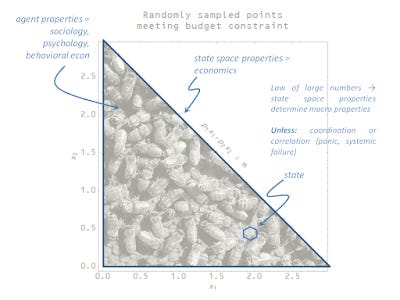Economics as and versus social science
... or, Macro bee different from micro.

Bees!
My blurb on how I think that the whole "economics is too complex to make neat mathematical models" argument really just tends to assume itself (i.e. the original meaning of question begging) was picked up over at Mike Norman Economics, where it was put in an interesting way. Sociologists et al say economists need to prove economics is not too complex to model and economists say sociologists et al need to prove it is too complex to model.
That is to say we have sociologists and economists making a play for the null hypothesis.
My personal view is that economists should get the null hypothesis in this case, but not for reasons that economists think they should.
The key point is that (probably) the only way the actions of millions of complex humans can be aggregated in a tractable way is for the law of large numbers to kick in. In that case, the bulk properties of the state space tell us more about macroeconomic properties than the properties of the agents. Also in that case, as long as the social science of the agents meets some pretty general constraints, there is a separation between the economics (study of the state space) and the social science (study of the agents). The mathematical laws of economics are emergent and (somewhat) independent of the social agent substrate.
I borrowed a diagram from this post about how utility (a potentially measurable behavioral property of agents [1]) and entropy (a property of the bulk state space) can reproduce some of the same economic relationships ... and added bees.
The bees in the graphic at the top of this post represent the agents, and the observed dances and other behaviors are the social science theory of the agents. The bulk properties of the hive (size of cells, size of hive) represent the economic theory. We can tell some things from the law of large numbers ... the size of a cell varies a bit, but the average size (for a given species) can be well known ... the number of bees gives us a good estimate of the size of the hive. These give us a good idea of honey output regardless of the individual dances telling us the direction to some flowers with tasty nectar. Large scale coordinations break down these relationships (e.g. colony collapse) [2].
In my link above, there are some other things that give us more information. For example, in a d-dimensional beehive with d >> 1, nearly all the bees are near the surface, not the interior ... as long as they are not coordinated to be in the interior (say, by the queen).
When this separation holds, then economics is more like physics. When it doesn't, economics is a social science.
If the details of the complexity of bee social structure strongly mattered, it would (likely) be impossible to figure out how much honey you could get from N bees. Now humans are more complicated than bees, but the same principle -- that the macro properties are mostly governed by the bulk properties of the available state space -- has to apply if macro is tractable. And if it's not tractable (a possibility), then it really should just be moral and historical arguments.
Footnotes:
[1] ... that turns out to not really be true of individual agents in many experiments.
[2] This is the case of non-ideal information transfer in the model.



